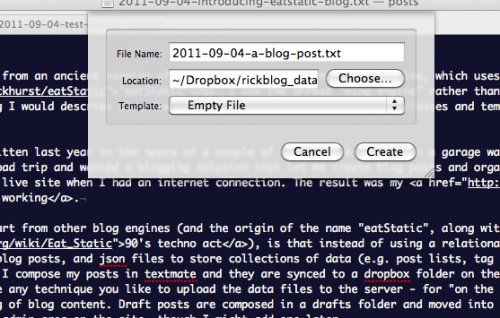Object storage and retrieval in PHP part 1 – JSON files
I mentioned in my post about eatStatic that I was using JSON files for storage of objects and arrays, but hoped to make it switchable to use mongdb. This is part one of a two-part post, demonstrating use of JSON files with json_encode() and json_decode().
Take the following simple class:-
class case_study {
var $id;
var $title;
var $body_text;
var $skills = array();
}
If we create an instance of this and add some data:-
$case_study = new case_study;
$case_study->id = 'my/case_study';
$case_study->title = 'My case study';
$case_study->body_text = 'Some text for the case study';
$case_study->skills['css'] = 'CSS';
$case_study->skills['sitebuild'] = 'Site Build';
and pass it to print_r(), we get this:-
case_study Object
(
[id] => my/case_study
[title] => My case study
[body_text] => Some text for the case study
[skills] => Array
(
[css] => CSS
[sitebuild] => Site Build
)
)
If we now encode it as JSON:-
$json_str = json_encode($case_study);
At this point, we can save the file to the filesystem – I tend to create a unique ID based on the current date/time and a random string. I won’t detail it all here, but you can see some of the helper functions I use in eatStaticStorage.class.php and eatStatic.class.php. One thing worth noting is that sometimes when reading a .json file back in from the filesystem, I was experiencing a bug where the last three characters were omitted – i’m not sure what was causing this, but it was fixed by changing my read_file() method to use file_get_contents(), instead of fread().
Once you have retrieved your JSON string you can decode it again:-
$case_study = json_decode($json_str);
and we end up with this:-
stdClass Object
(
[id] => my/case_study
[title] => My case study
[body_text] => Some text for the case study
[skills] => stdClass Object
(
[css] => CSS
[sitebuild] => Site Build
)
)
Notice that the array “skills” is now an object. We can set it back to an array using get_object_vars():-
$case_study->skills = get_object_vars($case_study->skills);
nb: this only happens for key => value arrays, if it was just a simple array e.g. array(‘css’,’sitebuild’), we wouldn’t need to pass it through get_object_vars(), as it would be maintained as an array.
This gets us back to where we started:-
stdClass Object
(
[id] => my/case_study
[title] => My case study
[body_text] => Some text for the case study
[skills] => Array
(
[css] => CSS
[sitebuild] => Site Build
)
)
sort of – we now have an object instance with all the attributes of the original object instance, but it doesn’t know it is a case_study object. In fact it isn’t a case_study object instance at all – we would have to create a new instance of case_study and copy the attributes across if we needed the real thing, but if you just want the data, this can be used as it is in most cases.
The above example is very simple, but it can get quite complex when your object contains arrays of objects, which in turn may contain arrays (and arrays of objects). The initial cheap and convenient trick of encoding an object instance and saving it, then retrieving, decoding and using it can then get quite hairy, but still less effort than splitting it out into different objects and maintaining in several different relational database tables.
In part two i’ll talk about how to use mongoDB to save and retrieve object instances in PHP.

